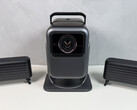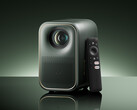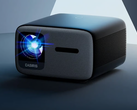Ultimea Apollo P40 LCD hands-on review: Bright business projector with some smarts
The Apollo P40 from Ultimea is a simple projector that has some internal smarts and a fairly good image thrown from an LCD system. It doesn't run Android TV, which means streaming apps are not available. However, it produces a clean image that may be well suited for a simple home theater setup or business presentations. How does it compare to the plethora of other projectors on the market? Let's take a look.
| Specifications | |
|---|---|
| Maximum Resolution | Full HD (1920x1080) |
| Projection Technique | LCD |
| Image Correction | Auto-focus, auto-keystone |
| Image size | 35-150 inches |
| Operating System | Custom |
| SoC | Unknown |
| RAM | Unknown |
| Storage | None available to end users |
| I/O | 1x HDMI, 1x AV out, 1x Aux audio out, 2x USB-A 2.0, DC in |
| Wireless | Wi-fi 2.4/5 GHz |
| Bluetooth | 5.0 |
| Speakers | 2x 5 Watt Dolby |
| Brightness | 700 ANSI Lumens |
| Lamp Life | Over 10 years |
| Contrast ratio | 1500:1 (per Ultimea) |
| Throw ratio | 1.4:1 |
| Dimensions and weight | 265 x 265 x 105 mm (10.4 x 10.4 x 4.1 in), 2.5 kg (5 lbs) |
Design and Case - Plastic and bulky
The Apollo P40, like most other projectors, is made entirely out of plastic. The build quality is fairly good. Seams are even and tight across the unit, and the plastic shell feels durable. The unit feels hollow, though. The P40 is cumbersome. While it's not unwieldy, it is rather bulky and requires dedicated table space. There is a threaded hole on the bottom for mounting the projector to a tripod, though in my experience, this made for a wobbly and unbalanced experience.
The Apollo P40 has a striking black disc on top to give it some visual flair, making it reminiscent of a record player. This disc serves no purpose other than aesthetics, but it is memorable. The lens has a built-in sliding cover to protect it when the projector is not in use.
I/O is fair, including an HDMI port, an AV out port (composite video), an 3.5 mm audio jack, and two USB-A 2.0 ports. The P40 can read video files from this drive (e.g., MP4) and play them back with a preloaded video player. It can also load image files.
All said, the Apollo P40 is reasonably well-built, particularly for the price, but its design fails to stand out amidst other projectors'. It is overall understated with slight flair, which may lend itself to an office or business setting.
Software and Features - Barebones with few smarts
The Apollo P40's software is very barebones. A simple menu appears after the projector boots up with options to change the input, cast the display of another device via AirPlay or Miracast, play videos, look at images, or listen to music. There is also an Office Suite option, which allows you to log into a WPS Office account and display documents. Unfortunately, this app was in Chinese, so I was unable to use it.
AirPlay and Miracast both work quickly and reliably (dependent on the WiFi network). The video player is also competent, and playback of Full HD movies from a USB drive is smooth and hiccup-free. The audio player is also quite good, and connecting a phone via Bluetooth is stable. The P40 also has auto-focus and auto-keystone that work reliably but are a bit slow at correcting the image.
Otherwise, the projector's software is slim. The settings options are simple but straightforward. While playing media, a pop-up menu is available to change picture mode and settings like brightness. While it lacks the features available to projectors running Android TV, the basics are here.
Picture and Sound - Bright and clean image with punchy speakers
With such a slim offering on the software front, the Apollo P40 makes up ground with an excellent projected image. The projector's lamp is rated at 700 ANSI lumens. As such, it can't quite support HDR content, but the picture is bright enough to be clear in a dimly lit room. With the lights on, the picture washes out too much to be visible.
The overall image is quite good. Details remain crisp in both bright and dark areas. There is no visible black crush in dark scenes, and contrast is clear. The projected image is only Full HD (though the projector can receive 4K input and downscale it). This means the picture will get fuzzy and grainy as the image size increases. Starting at about 70 inches, the picture quality begins to degrade.
Overall, the projected picture is crisp, bright, and is largely void of blemishes like black crush, blurred edges, and rainbowing/color banding. Even during difficult scenes in The Lord of the Rings: The Return of the King (from New Line Cinema), the Apollo P40 puts out a pleasing image.
The dual 5 Watt speakers are fairly good. They get reasonably loud at full volume, peaking at about 80 dB(A). They remain clear without any noticeable distortion or crackle. The volume progression is also fairly uniform; 50% volume sounds about half as loud as 100%, which isn't always the case with projectors.
The main downside of the speakers is the lack of bass, which makes the overall sound feel thin. It lacks punch and impact, which is quite noticeable in movies. For example, in a scene where a massive battering ram pounds a huge wooden door, the lack of bass leaves the impact of the ram feeling weak. In sum, the speakers are good enough for business presentations with some media, but external speakers should be used for movies.
Pros
+ clear and bright Full HD image
+ clear speakers with level volume progression
+ AirPlay and Miracast built in
+ auto-focus and auto-keystone
Cons
– lackluster software
– speakers lack base
– large, bulky footprint
Conclusion - Ultimea Apollo P40 is a cheap but simple projector
The Ultimea Apollo P40 is a basic projector with some smarts baked in. It spits out a clear and bright image with minimal flaws, which is a definite high point. The P40 struggles with weak and thin speakers and a lack of features, primarily streaming apps, which detract from the movie-viewing experience. Compared to other projectors running Android TV (like the Xgimi Horizon or Xming Page One), the Apollo P40 is fairly lackluster.
The P40's saving grace is price. At its MSRP of $299.99, it's a competent projector, especially for a boardroom or simple home theater setup. However, Ultimea regularly discounts the projector, making it a compelling option. Currently, the P40 is on sale for $199.99, and it's difficult to beat at that price.
If you're hunting for a simple projector that produces a bright, clean image, the Apollo P40 is a good option (especially for business use). However, if you want an all-in-one projector solution for streaming media, you'll need to look elsewhere.
Price and Availability
The Apollo P40 Projector is available from Ultimea for $299.99 from the company's website or other retailers like TomTop (which ships from a warehouse in the U.S.). Notebookcheck readers can buy the Apollo P40 at TomTop for $189.99 with offer code APLOUS. European reader can buy the Apollo P40 from TomTop for €185.99 with offer code APLOUAL.
Transparency
The selection of devices to be reviewed is made by our editorial team. The test sample was provided to the author as a loan by the manufacturer or retailer for the purpose of this review. The lender had no influence on this review, nor did the manufacturer receive a copy of this review before publication. There was no obligation to publish this review. As an independent media company, Notebookcheck is not subjected to the authority of manufacturers, retailers or publishers.
This is how Notebookcheck is testing
Every year, Notebookcheck independently reviews hundreds of laptops and smartphones using standardized procedures to ensure that all results are comparable. We have continuously developed our test methods for around 20 years and set industry standards in the process. In our test labs, high-quality measuring equipment is utilized by experienced technicians and editors. These tests involve a multi-stage validation process. Our complex rating system is based on hundreds of well-founded measurements and benchmarks, which maintains objectivity. Further information on our test methods can be found here.











































